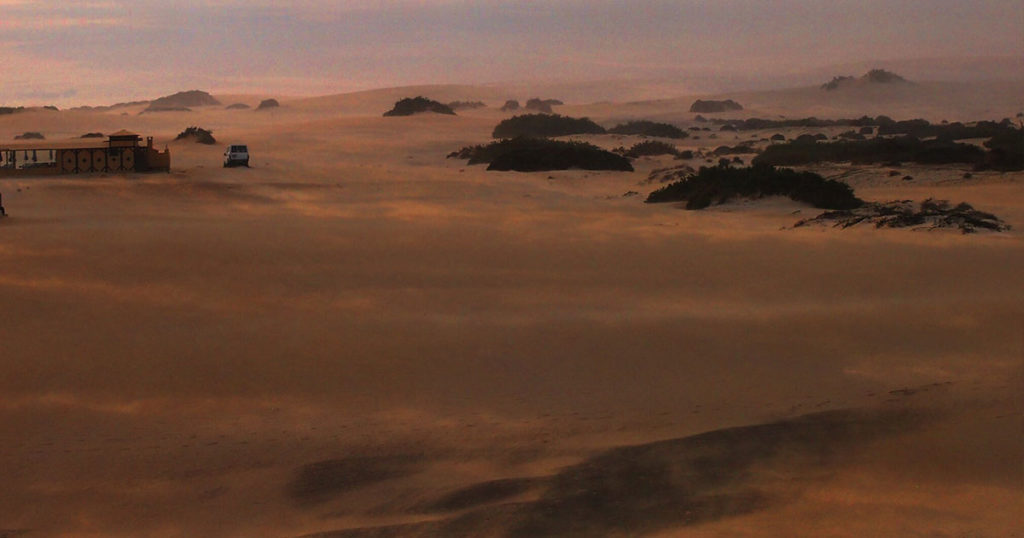
A friend in Kansas commented in an email that the wind never stops in his part of the state. There are days, he said, when a breeze rather than a gale blows, and times when the rush of air is refreshing. But the wind is a daily presence, and it comes at 30-45 mph frequently enough to be depressing, especially when those winds occur in the winter and the ambient air temperature is often 15 degrees Fahrenheit or lower. “To be outside in such winds with such temperatures is just painful,” he had written, and I remembered his comment when in mid March a strong, warm wind from the south hit Gijón. It was a wind, not a gentle breeze, but not the cold one my friend lived with. This one came from the Sahara, laden with sand.
Warm winds from the south are not unusual, but I had never experienced one like this, carrying enough red sand to coat cars and color the sky orange. How often does this happen? I asked, and learned that in the Canary Islands it happens every year. It’s called calima, and with that much particulate, the air quality was so abysmal that the weather reports included warnings not to exercise. What good did it do to have a wind at tolerable temperatures instead of my friend’s freezing ones if you couldn’t expose yourself to it?
At the same time the sand was arriving from the south, the news blowing in from the north about Ukraine and Russia was dismal. Further threats, new ultimatums, more fear, and greater sums of EU money to be spent for larger piles of arms. Where could one escape the ills of politics or the whims of nature? Sheltering in place, a phrase made familiar during the pandemic, would provide scant protection in Spain, due to the crippling rise in energy costs, already alarming in September when electricity price hikes had people despairing, but now compounded with rising oil prices. Even as other EU countries were taking measures to ease the burden on the citizenry, Spain was announcing new increases. In late March I was dozing in a friend’s car while he listened to the radio as he drove, but I heard through the haze of sleep the announcement of a 10 percent electricity increase for the following day. I came fully awake. What? I asked, incredulous. This can’t go on.
In the face of huge hikes in fuel costs, truckers had started an indefinite strike on March 14. In the grocery stores people scrambled to buy up goods while they were still on the shelves, because with no transportation, one couldn’t count on businesses restocking. The government promised relief soon but the details were murky, and amid talks, the government was raising energy prices some more. It reminded me of negotiations where your offer is met not by a counteroffer nor by steadfast adherence to the original price, but by upping it. Each attempt to meet in the middle is countered by harsher conditions. It makes you throw up your hands in despair. Meanwhile, a student in an evening class asked if I worked in the mornings. No, I said, curious about what was behind the question. If you did, you’d have found it impossible to teach, he told me, because striking truckers had gathered on the avenue outside the school at one o’clock that day and spent a full hour leaning on their horns. Sometimes in a sort of tuneful pattern, and sometimes sounding like mad chaos. My student felt his apartment shaking from the heaving trucks in the street outside. He had hoped I wasn’t trying to hold class.
My Kansas friend had remarked that the wind he endures is the fly in the otherwise palatable dish of life that Kansas offers. The days in the early summer when no wind blows are a rare and celebrated event in his life. Will calm have returned to Spain before it does to Kansas? Will early summer bring a reason to celebrate? Listening to the news the following Sunday, I heard again about the electricity increase for the coming week, this time six percent. Six is better than 10. Six is almost a gentle breeze. Maybe we’d better celebrate while we can.

